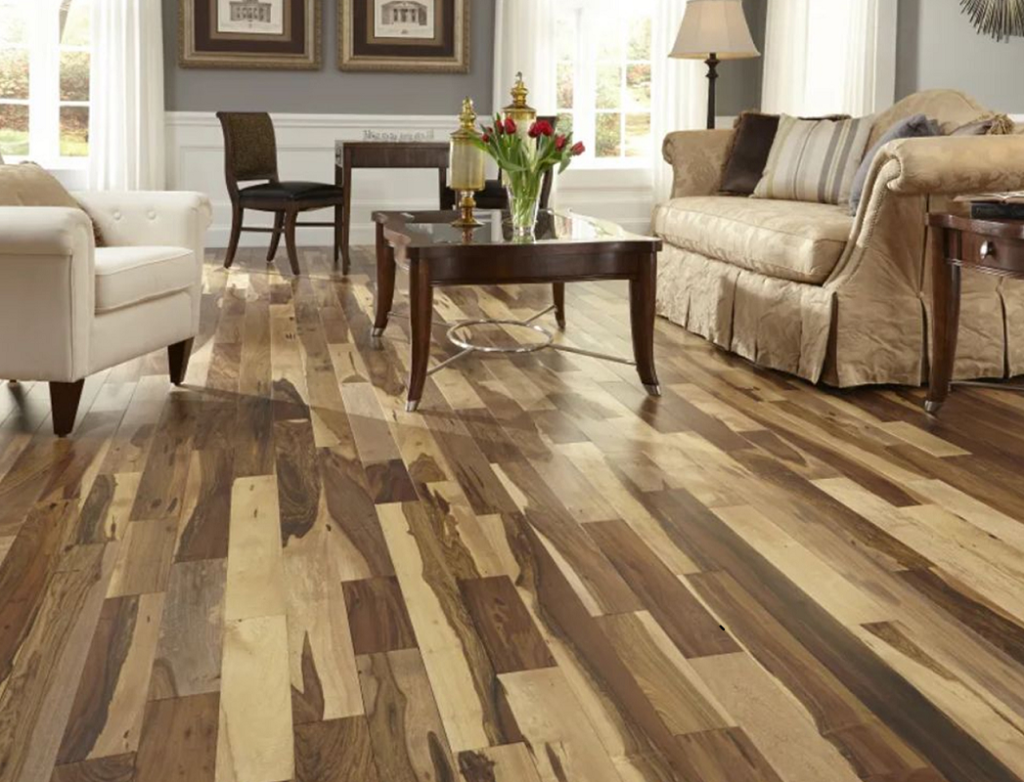Bamboo flooring is a popular and environmentally friendly alternative to traditional hardwood flooring. It is made from the bamboo plant, a fast-growing grass that is highly sustainable and renewable. Bamboo flooring is typically made by cutting the bamboo stalks into thin strips, which are then pressed and glued together to form planks. The finished product is then sanded, finished, and cut into standard sizes for installation.
Bamboo hardwood flooring has several advantages over traditional hardwood flooring. It is generally more durable and resistant to moisture and pests, making it a good choice for areas of the home that may be prone to moisture or pests. It is also easier to install than hardwood and can often be installed as a floating floor, which means it is not attached to the subfloor and can be easily removed if necessary.
Engineered bamboo flooring is also more environmentally friendly than traditional hardwood flooring. Because bamboo is a fast-growing grass, it can be harvested and regrown in just a few years, making it a more sustainable choice. Additionally, bamboo wood flooring production generates fewer carbon emissions than the production of traditional hardwood flooring.
Overall, bamboo wood flooring is a durable, environmentally friendly, and attractive flooring option that can be a great choice for a variety of home styles and settings.
Pros of Bamboo Hardwood Flooring

Durable
One of the biggest advantages of bamboo flooring is its durability. Bamboo is grass, not wood, which means it is naturally harder and more resistant to damage than many types of wood flooring. In fact, it is often compared to hardwood species like oak and maple in terms of strength and durability.
Sustainable
Waterproof bamboo flooring is also a sustainable choice for flooring. It is a rapidly renewable resource that can be harvested every three to five years, compared to the decades it takes for trees to mature. In addition, the production of bamboo wood flooring has a lower environmental impact than the production of many other types of flooring materials.


Variety of options
There is several types of bamboo flooring to choose from, including solid bamboo, engineered bamboo, and bamboo vinyl. Engineered bamboo flooring is made from solid strips of bamboo that are laminated together, while engineered bamboo is made from layers of bamboo that are pressed together. Bamboo vinyl is a type of flooring that is made to look like bamboo, but it is actually made from synthetic material.
Waterproof
Waterproof bamboo flooring is also an option for homeowners who are looking for a flooring material that can withstand spills and moisture. This type of engineered bamboo flooring is treated with a special finish that helps to protect it from water damage.

Cons of Bamboo Wood Flooring
Comparatively expensive
One potential drawback of waterproof bamboo flooring is that it can be more expensive than other flooring types, such as carpet or vinyl. It also requires special cleaning and maintenance to keep it looking its best.


Costly
Bamboo hardwood flooring can be more expensive than some other types of flooring, such as carpet or vinyl. This may be a drawback for homeowners who are on a tight budget or who are looking for a more affordable flooring option.
Maintenance
Bamboo flooring requires special cleaning and maintenance to keep it looking its best. This includes regular sweeping and vacuuming to remove dirt and debris and occasional mopping with a mild cleaner. This may be a burden for homeowners who need more time or resources to care for their floors properly.


Expansion and contraction
Bamboo is a natural material that can expand and contract with changes in temperature and humidity. This can lead to gaps between the boards or warping if the flooring is not properly acclimated before installation. This may be a concern for homeowners who live in areas with significant temperature and humidity fluctuations.
Limited color options
Bamboo hardwood flooring is typically available in a limited range of colors, which may not be suitable for all decor styles. This may be a drawback for homeowners who are looking for a specific color or style of flooring.

The bottom line:
Despite these potential downsides, bamboo flooring is a durable and sustainable option that can add beauty and value to your home. If you’re in the market for new flooring, it’s worth considering. However, be sure to weigh the pros and cons carefully before making a decision. Overall, bamboo flooring is a great choice for those who want a strong, sustainable, and stylish flooring option for their home.
In conclusion, bamboo flooring is a versatile and sustainable option for those looking to update their home’s flooring. It is made from the fast-growing bamboo plant and is more durable and resistant to moisture and pests compared to traditional hardwood flooring. It is also easier to install and has a lower carbon footprint during production. These features make bamboo flooring a great choice for homeowners looking to add value and style to their homes while also considering the environment.
